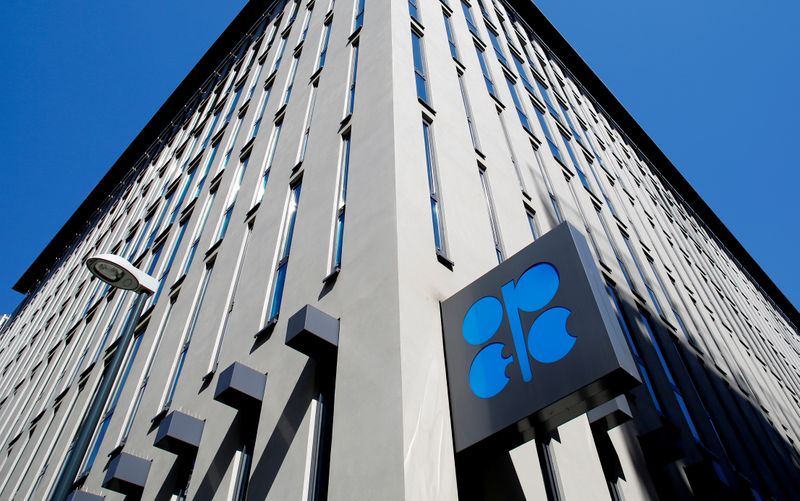By Ahmad Ghaddar, Rania El Gamal and Alex Lawler
MOSCOW/DUBAI/LONDON (Reuters) - OPEC, Russia and allies were set on Saturday to extend record oil production cuts until the end of July after crude prices doubled in the past two months on the back of their efforts to withdraw almost 10% of global supplies from the market.
The group known as OPEC+ was also set to demand countries such as Nigeria and Iraq, which exceeded quotas in May and June, compensate by making extra cuts in July to September.
OPEC+ had initially agreed in April that it would cut supply by 9.7 million barrels per day (bpd) during May-June to prop up prices that collapsed due to the coronavirus crisis. Those cuts were due to taper to 7.7 million bpd from July to December.
Benchmark Brent crude (LCOc1) climbed to a three-month high on Friday above $42 a barrel, after diving below $20 in April. Prices still remain a third lower than at the end of 2019.
"The agreements went ahead as planned," Iranian Oil Minister Bijan Zanganeh told Shana news agency after OPEC approved extending the deal until July during a video conference.
"The main issue was a lack of compliance of members like Iraq with production cut quota, and it was decided that they compensate for that in coming months," he said.
The decisions still need to be approved by OPEC+, which includes 10 producers such as Russia and Kazakhstan. The OPEC+ talks began at about 1500 GMT.
Saudi Arabia, OPEC's de facto leader, and Russia have to perform a balancing act of pushing up oil prices to meet their budget needs while not driving them much above $50 a barrel to avoid encouraging a resurgence of rival U.S. shale production.
Graphic: OPEC+ Cuts for May and June , https://fingfx.thomsonreuters.com/gfx/editorcharts/yxmvjorrwpr/eikon.png
BULGING INVENTORIES
The April deal was agreed under pressure from U.S. President Donald Trump, who wants to avoid U.S. oil industry bankruptcies.
Trump, who previously threatened to pull U.S. troops out of Saudi Arabia if Riyadh did not act, spoke to the Russian and Saudi leaders before Saturday's talks, saying he was happy with the price recovery.
While oil prices have partially recovered, they are still well below the costs of most U.S. shale producers. Shutdowns, layoffs and cost cutting continue across the United States.
As global lockdown restrictions to halt the spread of the coronavirus are being eased, oil demand is expected to exceed supply sometime in July but OPEC has yet to clear 1 billion barrels of excess oil inventories accumulated since March.
Nigeria's petroleum ministry said Abuja backed the idea of compensating for its excessive output in May and June.
Iraq, which had one of the worst compliance rates in May, agreed to additional cuts although it was not clear how Baghdad would reach agreement with oil majors on curbing Iraqi output.
Iraq produced 520,000 bpd above its quota in May, while overproduction by Nigeria was 120,000 bpd, Angola's was 130,000 bpd, Kazakhstan's was 180,000 bpd and Russia's was 100,000 bpd, according to OPEC+ data.
Graphic: OPEC May Production, https://fingfx.thomsonreuters.com/gfx/editorcharts/nmopakdaopa/eikon.png
OPEC+'s joint ministerial monitoring committee, known as the JMMC, would now meet every month until December to review the market, compliance and recommend levels of cuts.
The next JMMC meeting is scheduled for June 18 while the next full OPEC and OPEC+ meeting will take place Nov 30-Dec 1.
